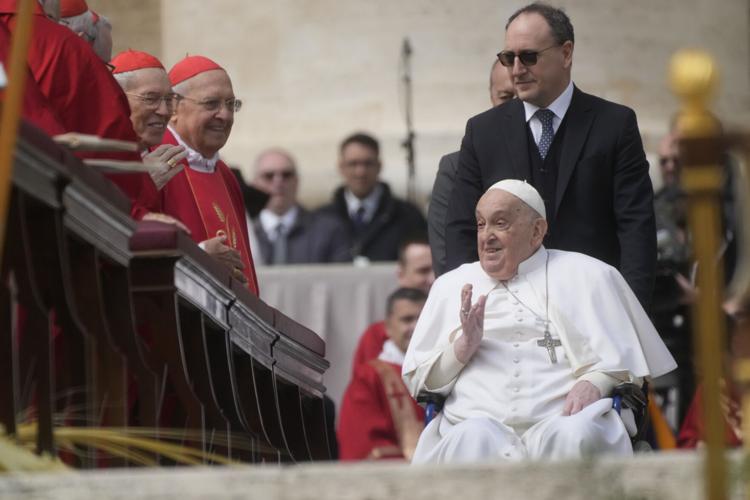Pope Francis: Latest News On His Age & Death At 88
Did the passing of Pope Francis mark the end of an era, or a new beginning for the Catholic Church? On Easter Monday, April 21, 2025, the world mourned the loss of Pope Francis, a pontiff whose papacy was defined by a commitment to the marginalized and a willingness to challenge the status quo.
The news, delivered by Cardinal Kevin Farrell, Camerlengo of the Holy Roman Church, from the Casa Santa Marta, echoed around the globe: Pope Francis had died at the age of 88. The announcement brought an end to a papacy of profound impact, leaving an indelible mark on the Church and the world. His death was attributed to a stroke and heart failure, as the Vatican confirmed.
| Category | Details |
|---|---|
| Full Name | Jorge Mario Bergoglio |
| Born | December 17, 1936, Buenos Aires, Argentina |
| Died | April 21, 2025, Vatican City |
| Age at Death | 88 years old |
| Papacy | 2013 - 2025 |
| Predecessor | Pope Benedict XVI |
| Successor | To be determined |
| Education | Master's degree in Chemistry |
| Religious Order | Jesuits |
| Notable for | First Pope from the Americas, champion of the poor, reformer of the Church, advocate for climate action. |
| Quotes | "There is only one thing that really makes us age, grow old interiorly: Not age, but sin. |
| Reference | Vatican Official Website |
Born Jorge Mario Bergoglio in Buenos Aires, Argentina, in 1936, Pope Francis was the first pope from the Americas. His election in 2013 marked a significant departure for the Catholic Church, and not just because of his geographical origins. He was also the first Jesuit pope and the first to take the name Francis. His papacy was defined by a radical simplicity, a profound humility, and a deep concern for the marginalized, earning him both admiration and criticism. The world watched as he sought to reshape the Church, challenging deeply rooted norms and seeking to change the perception of the Catholic Church around the world.
The announcement of his death, particularly on Easter Monday, added a layer of poignancy to the event, reflecting a life dedicated to service and faith. During his tenure, he actively traveled the globe. While Pope Franciss predecessor, Pope Benedict XVI, lived to the age of 95, he had chosen to step down from his position, a decision that highlighted the physical challenges of the papacy.
His humble style contrasted sharply with the traditional image of the papacy. He eschewed many of the trappings of power, choosing to live in a simple residence and often opting to interact with people directly, touching them with a level of genuine compassion. The pontiff had suffered a number of health issues in recent years, and was growing increasingly frail before his passing, adding another layer of context to the narrative of his final years.
The late pontiffs focus on social justice and his willingness to address issues like climate change and economic inequality set him apart. He did not shy away from criticizing capitalism and advocating for the poor, which resulted in friction with more conservative factions. He championed a more inclusive church. Pope Franciss focus on the poor, the marginalized, and the environment marked a distinct shift from the priorities of some of his predecessors. He sought to reform the Church, making it more accessible and relevant to the modern world.
His papacy wasn't without its challenges. He faced resistance from traditionalists within the Church. He also had to address sensitive issues, including the sexual abuse crisis that has plagued the Catholic Church for decades. His efforts to modernize the Church and engage with contemporary issues, while lauded by many, also generated controversy and criticism from conservative elements.
The impact of Pope Francis extended beyond the Catholic Church. He engaged in interfaith dialogue, promoting peace and understanding between different religions. His focus on global issues, such as climate change, earned him recognition and respect from world leaders and international organizations.
His legacy is complex and multifaceted. He will be remembered as a transformative figure, who sought to renew the Catholic Church and address the challenges of the modern world. He inspired many, challenged others, and left an indelible mark on the papacy and the world. The circumstances surrounding his death, including the health challenges he faced in his final years, underscore the human element of the papacy, reminding the world that even the most powerful figures are not immune to the frailty of life.
His pronouncements and actions often made headlines. His simple lifestyle, his efforts to reform the Church, and his focus on social justice were all major aspects of his public persona. In a speech delivered on December 17, 2022, the Pope himself observed about the Virgin Mary.
The loss of Pope Francis leaves a void, a moment for reflection. As the Church prepares for a new chapter, the memory of his leadership, compassion, and commitment to change will continue to resonate. The legacy of Pope Francis is a rich tapestry, woven with threads of faith, social justice, and a deep commitment to the human spirit.


